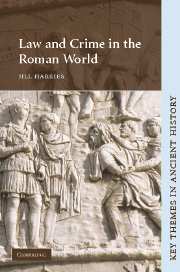Book contents
- Frontmatter
- Contents
- Preface
- 1 Competing discourses
- 2 Public process and the legal tradition
- 3 Cognitio
- 4 The thief in the night
- 5 Controlling elites I: ambitus and repetundae
- 6 Controlling elites II: maiestas
- 7 Sex and the City
- 8 Remedies for violence
- 9 Representations of murder
- Bibliographical essay
- References
- Index
1 - Competing discourses
Published online by Cambridge University Press: 05 June 2012
- Frontmatter
- Contents
- Preface
- 1 Competing discourses
- 2 Public process and the legal tradition
- 3 Cognitio
- 4 The thief in the night
- 5 Controlling elites I: ambitus and repetundae
- 6 Controlling elites II: maiestas
- 7 Sex and the City
- 8 Remedies for violence
- 9 Representations of murder
- Bibliographical essay
- References
- Index
Summary
Defining crime is harder than might be expected. We all think we know what is bad or wicked or what might be termed in general usage ‘criminal’. We may also have some ideas about the functions of the ‘criminal justice system’, and its purpose, to punish, deter and/or reform the ‘criminal’ and keep the law-abiding majority safe. Dissatisfaction may be expressed – to the alarm of politicians – if the system apparently fails in its purpose. Crime statistics will be offered to show progress (or not) in dealing with ‘the problem of crime’; other indicators will be used to ascertain if the ‘public’ feel more or less safe in their homes or on the streets. ‘Policing methods’ may be debated and the sentences handed down by judges criticised. Moral discourse is inextricably linked with legal process: ‘evil’ people are expected to receive due punishment through the courts.
Crime is the concern of every citizen, and in the Roman world, as now, it may be defined, provisionally, as an offence against the community. In England the criminal is proceeded against by the state, as ‘Regina (or, in Scotland, ‘Her Majesty's Advocate’) versus X’. At Rome, however, the role of policing was limited (Nippel 1984). Although there were ‘public courts’ of various kinds, there was no police authority to conduct investigations or construct ‘public’ prosecutions, which were largely left to the initiative of individuals.
- Type
- Chapter
- Information
- Law and Crime in the Roman World , pp. 1 - 11Publisher: Cambridge University PressPrint publication year: 2007

